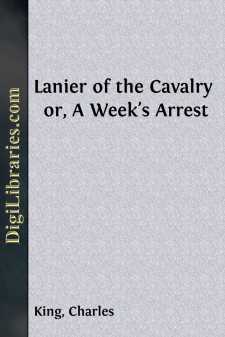Categories
- Antiques & Collectibles 13
- Architecture 36
- Art 48
- Bibles 22
- Biography & Autobiography 813
- Body, Mind & Spirit 142
- Business & Economics 28
- Children's Books 14
- Children's Fiction 11
- Computers 4
- Cooking 94
- Crafts & Hobbies 4
- Drama 346
- Education 46
- Family & Relationships 57
- Fiction 11828
- Games 19
- Gardening 17
- Health & Fitness 34
- History 1377
- House & Home 1
- Humor 147
- Juvenile Fiction 1873
- Juvenile Nonfiction 202
- Language Arts & Disciplines 88
- Law 16
- Literary Collections 686
- Literary Criticism 179
- Mathematics 13
- Medical 41
- Music 40
- Nature 179
- Non-Classifiable 1768
- Performing Arts 7
- Periodicals 1453
- Philosophy 64
- Photography 2
- Poetry 896
- Political Science 203
- Psychology 42
- Reference 154
- Religion 513
- Science 126
- Self-Help 84
- Social Science 81
- Sports & Recreation 34
- Study Aids 3
- Technology & Engineering 59
- Transportation 23
- Travel 463
- True Crime 29
Lanier of the Cavalry or, A Week's Arrest
by: Charles King
Categories:
Description:
Excerpt
The sun was sinking low beyond the ford of the foaming Platte. The distant bluffs commanding the broad valley of the Sweetwater stood sharp and clear against the westward skies. The smoke from the camp-fires along the stream rose in misty columns straight aloft, for not so much as a breath of breeze had wafted down from the far snow fields of Cloud Peak, or the sun-sheltered rifts of the Big Horn. The flag at the old fort, on the neighboring height, clung to the staff with scarcely a flutter, awaiting the evening salute of the trumpets and the roar of the sunset gun.
The long June day had seemed unusually unconscionably long to the young girl flitting restlessly about the vine-covered porch of the roadside cottage. She laid the big binocular aside, for perhaps the twentieth time within the hour, with a sigh of impatience, a piteous quiver about the pretty, rosebud mouth, a wistful, longing look in the dark and dreamy eyes. Ever since stable call, and her father's departure to his never-neglected duty, she had hovered about that shaded nook, again and again searching the northward slopes and ridges. The scouts had been in three hours ago, reporting the squadron only a mile or so behind. It should have dismounted, unsaddled, fed, watered, and groomed by this time, and Rawdon should have been here at her side—Rawdon, whom she had not seen for three mortal days—Rawdon, whom, for three mortal weeks before the march, she had not missed seeing sometimes several times a day, even when he was on guard—Rawdon, whom she had never set eyes on before the first of April, and whom now she looked upon as the foremost soldier of the regiment, when in point of fact he was but a private trooper, serving the first part of his first enlistment, in the eyes of his elders a mere recruit, and in those of Sergeant Fitzroy an unspeakable thing.
Another long peep through the signal glasses, another sigh, and then she came, this girl of seventeen, in her dainty white frock, and plumped herself dejectedly down on the top step, with two very shapely, slender, slippered feet displayed on the second below, two dimpled elbows planted on her knees, two flushed, soft, rounded cheeks buried in two long and slender hands. Away over at the stables she could hear the tap, tap, of curry-comb on brush-back, as the First Squadron groomed its fidgety mounts. Away up the valley the voices of the children in the Arapahoe village rose gleefully on the air. Away up among the barracks and quarters at the fort, the band of the Infantry was playing sweet melody. Peace, content, and harmony were roundabout her, but the dark eyes, welling with unshed tears, told of a troubled heart.
And then of a sudden the tears were dashed away and the girl sprang to her feet. A blithe voice hailed her from within.
"Dey's comin', Miss Dora—two on 'em, at least—like enough to be twin brudders."
The girl ran to the northward corner again and gazed out across the rushing, swollen river. Not so much as a sign of a dust-cloud to tell of marching cavalry, and she turned again, with rebuke ready on her tongue, but again the voice from within:
"Comin' t 'other way, chile. Must ha' took the lower fohd and rode roun' back o' de stables," and, with the words, a laughing "mammy" came bustling to the front door, a cool white pitcher in one hand, a tray with glasses in the other.
"Ah know well 'nuff what brings de lieutenant round dis way. As for dat—trash—wid him"—and here came a chuckle of delight at her own wit—"he just cain't help hisself." But Dora was not listening....












